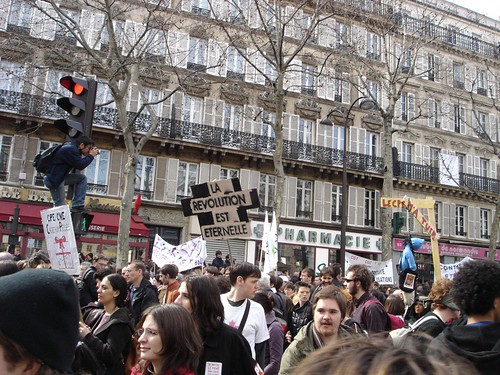08/09/07
Existence! Resistence! ...eh back in Oslo

4th of April 2006, from one of the many demonstrations against the new labour law
It’s almost two months since I left Paris and time is overdue to get going with the second phase of this blog. One thing is certain; one will always have Paris, but for the time being it will be a long-distance relationship, slowly withering into a mythical landscape which hopefully will help me making some anthropological sense of it. (A landscape I hope will be fuller of poetry and revolt, than social organisation, cultural artefacts and postcolonial theory :-) ).
As some squandered drops of water unfortunately landed on my thereafter defunct laptop, the unfinished blog post from my last day in Belleville is no longer accessible. I’m now unable to get back to how I felt having my last croissant beurre and coffee at Zorba, my last walk through the street market at the boulevard and the narrow, winding streets of the hill above, my extravagant last lunch (almost raw grilled tuna [never, ever complain that something is too raw in France, if you want to keep up apparences being at least partly cultivated despite some obvious traits of the noble savage from up North]) at the local Asian/fusion restaurant. Luckily, the highlights from the conversation with the Moroccan taxi-driver on the way to the airport are still safe in my little cahier. While drinking my glass of white wine at the restaurant, I remember thinking about the expression “a heavy heart”. I was feeling it physically. Not sorrow or sadness. Just a heavy feeling in my chest.
This evening I revived some of the sentiment of being in Paris, when I saw Je suis né d’une cigogne by Tony Gatlif (Eng. wikipedia) at the cinematheque. The film is from 1998, but the themes appear to be ever-present in France the last 20 or even 30 years. The first scene in the film was a demonstration, with people carrying huge banners proclaiming Existence! Résistance! while shouting tous ensemble tous ensemble (“everybody together”) just like they did during my fieldwork. In the banlieues life was drab and the flats crammed. The unemployed protagonist was selling L’Itineraire (a local version of The Big Issue, or =Oslo), an Arab immigrants felt pas chez nous (not at home), while another replaced his son’s name Ali with Michel (“because everyone here’s called that”) while eating pork with his family (the director’s real name is Michel, and he is of Algerian Andalusian Roma origin), and an old lady guarded her last Luis XVI chair from the insensitive bailiff while claiming she knew [the socialist] Jaurès, [the anarchist and communard] Louise Michel and fought for the commune and the intellectual little Ali, after having torched his father’s car, read La société du spectacle and listened to anarchists on Radio Libertaire talking about Algeria. The characters were angry and a little bit crazy and it was all recognisable and quite French to me.
This anarchic atmosphere, the anger and revolt, is the first aspect of Paris I’ll try to describe. In the four weeks, I’ll have ready a paper for a seminar with the - oh! gosh - so romantic title “Revolutionary Paris”. But before that brief return to Paris (to intellectual - and bourgeoise - rive gauche this time, except for a guided visit to Le mur de fédérés where the last communards got shot) for the seminar, I’ll get through the final stage of the local election campaign, half a ton of monographs and anthropological literature for the seminars I teach, colder autumn days (cyclists are already wearing gloves in the morning) and perhaps some more blog posts.
No feedback yet
| « Ethnography under colonialism: what did Evans-Pritchard think of it all? | Rainy day and interviews » |

